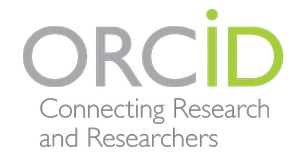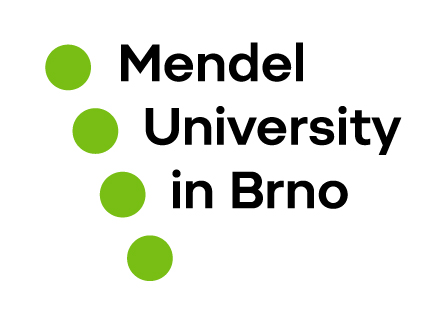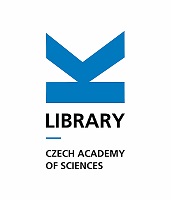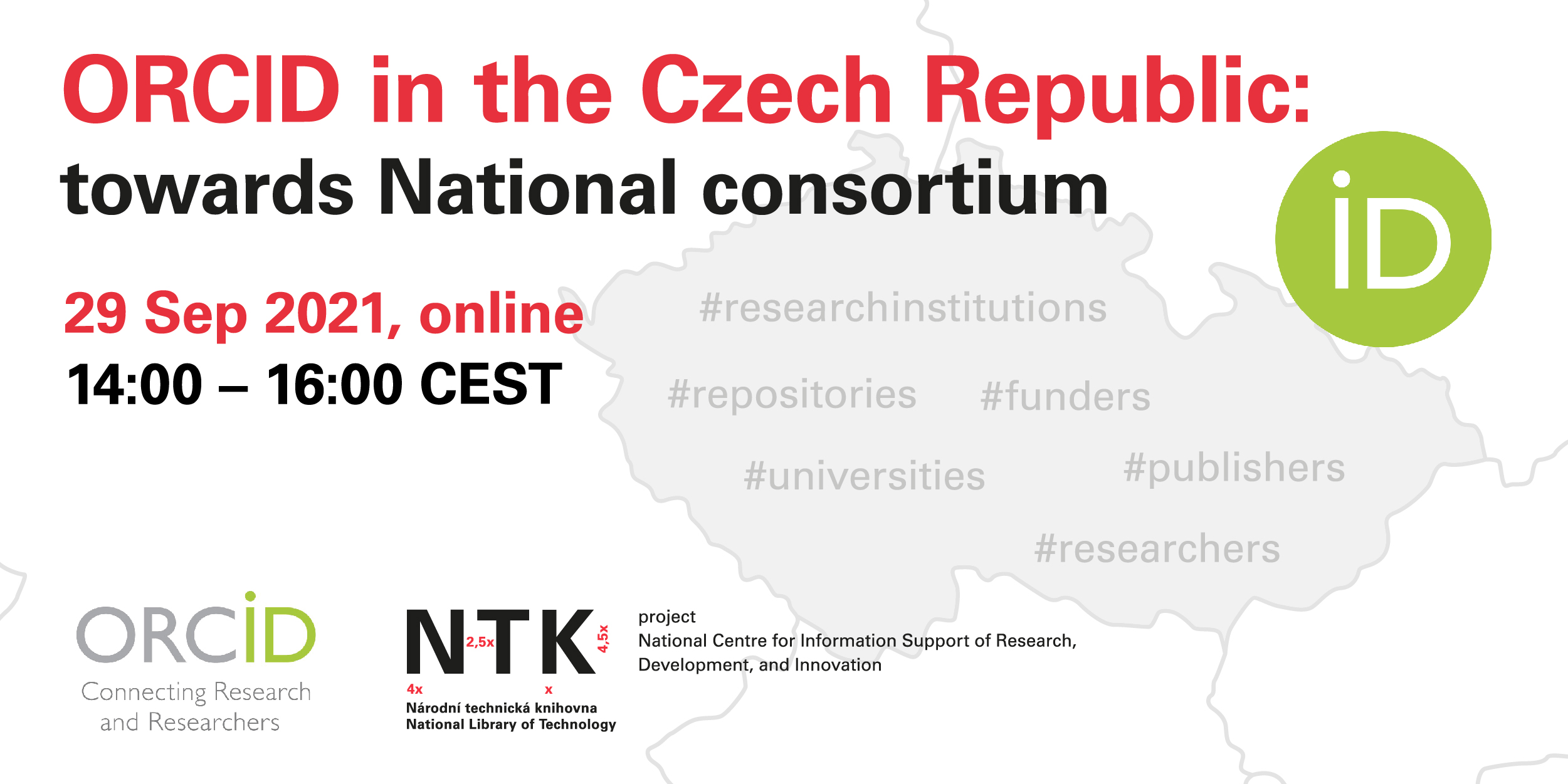The Czech National Library of Technology and international non-profit organization ORCID which generates and maintains unique persistent identifiers for researchers, will host together an online workshop to discuss options for national approach to ORCID implementation in the Czech Republic and possible establishment of the Czech ORCID Consortium.
Target audience: research institutions leadership (representatives, vice-rectors for research, ect.), librarians, service providers, funders, publishers and researchers.
Join this session to discuss possibilities for ORCID implementation and membership benefits, and learn more about other consortial approaches in the community.
We look forward to your participation!
Registration here
29 September 2021 (14:00 - 16:00 CET)
Welcome and Introduction
Eva Hnátková (Open Science Coordinator at NTK) - moderator
ORCID as a Community of Practice
Gabriela Mejias (Engagement Manager at ORCID)
German ORCID Consortium: National Approach to ORCID Adoption
Britta Dreyer (Head of PID and Metadata Services at TIB)
ORCID iDs in Czech Current Research Information Systems
Jan Dvořák (Researcher at IISL of Charles University)
Towards Czech ORCID Consortium
Barbora Votavová (ORCID Coordinator at NTK)
Open Discussion
- Q&A session with the audience
What is ORCID?
ORCID is a non-profit organization supported by a global community of member organizations, including universities, research organizations, publishers, funding providers, professional associations and other stakeholders in the research ecosystem. The organization was founded in 2010 and the service was launched in 2012. ORCID provides a unique persistent identifier for authors and solves the problem of authors' identical or similar names thanks to the central register. ORCID allows you to manage all the outputs of scientists in one place, which are automatically modified into individual profiles using their unique iD. Proper identification of researchers using ORCID is only one part of the whole, so that IDs can be used to the best of their ability ORCID IDs should be linked to research papers, grants, research organizations and other entities.
In April 2019, the Czech Government approved the Action plan for National Strategy of Open Access to Scientific Information for 2017-2020. One of its measures was to introduce unique identifiers for authors (ORCID) as a mandatory part of the R&D&I Information System (the national CRIS ‘IS VaVaI’). This national R&D&I Information System collects information on R&D&I supported from public budgets in the Czech Republic and is the only authorized, complete and binding source of this information. Later in October 2020, the Czech Research, Development and Innovation Council (R&D&I Council), which administers and operates the R&D&I Information System, released a call for research organizations to introduce ORCID for researchers to improve research evaluation and bibliometric analysis, requesting ORCID iDs for research publications reported on Czech National CRIS – IS VaVaI 2.0.
Topics addressed at the workshop
ORCID as a Community of Practice
Gabriela Mejias
ORCID is a community effort. As such, effective ORCID implementations, researcher awareness and adoption, can be improved when the research community coordinates efforts, shares successes, and supports each other in local outreach and integration initiatives. In 2015 ORCID launched a consortium program to develop communities of practice that can apply ORCID tools, services, and resources in regional and national contexts. To date there are 24 national consortia established across the globe. Join this presentation to explore European consortium use cases and learn about the benefits of building a national ORCID consortium.
German ORCID Consortium: National Approach to ORCID Adoption
Britta Dreyer
The increasing number of researchers, the growing volume of publications and the broadening definition of publications including research data and research software in the context of Open Science aggravate the problem of unambiguously associating researchers with their research output. ORCID iD can improve the quality and efficiency of the automatic collection and aggregation of publications. The unique identification of researchers, the persistent link between them and their publications as well as to further identifiers are only three usage scenarios for the use of ORCID iDs in scientific communication. The ORCID database, which can be integrated in many ways, enables research funders, scientific institutions and researchers to obtain cross-institutional, verified information on all research activities, such as text publications and research data, as well as funding received. On the one hand, these are used as performance indicators for researchers, universities and non-university research institutions. On the other hand, institutions regularly face the challenge of maintaining cross-institutional as well as detailed faculty-, institute-, or chair-specific publication lists. For this purpose, they implement institutional repositories, publication databases, university bibliographies and CRIS (=Current Research Information System). At this point, at the latest, the need for clear identification of academic staff and their assignment to the internal organizational structure becomes apparent. The ORCID DE project, which has been funded by the DFG since May 2016, together with the ORCID Germany consortium, supports universities and research institutions in the implementation of ORCID. The ORCID Germany consortium provides first level support, an information and dialog platform and the Premium ORCID membership at a reduced price.
ORCID iDs in Czech Current Research Information Systems
Jan Dvořák
The adoption of ORCID iDs by Czech researchers is increasing, in part as a result of the October 2020 call for personal identifier collection by the R&D&I Council. We present statistics based on the data of the Czech R&D&I Information System (the national CRIS). We look into the diverse implementation patterns that are seen at institutions. We outline opportunities for tighter integrations of information systems and show how they can generate value for the researchers as well as for their institutions. We also give tips for institutions to amend their researchers’ records before they can roll out fully automated integrations.
Towards Czech ORCID Consortium
Barbora Votavová
In November 2020, Czech Government approved the funding to MEYS for a 7 year project ‘National Centre for Information Support of R&D&I’ led by National Library of Technology in Prague. The National Centre for Information Support of R&D&I should serve to increase the quality and efficiency of the national R&D&I environment and to reduce the administrative burden on the staff of research organizations, i.e. as a support tool for universities and whole R&D&I. One of the goals is to establish and lead a national ORCID consortium.Speakers
Gabriela Mejias

 https://orcid.org/0000-0002-1598-7181
https://orcid.org/0000-0002-1598-7181
Gabriela Mejias is the ORCID Engagement Manager for Global Consortia. She leads the team that supports the 24 national ORCID consortia. As part of her role, she works with communities of practice implementing regional and national strategies of ORCID adoption and engages with the wider community to raise awareness of persistent identifiers (PIDs). She is interested in learning more about and contributing to open research infrastructures. She serves in the Board of Networked Digital Library of Thesis and Dissertations (NDLTD), in the NISO Plus Advisory Committee and is a member of the Society for Scholarly Publishing (SSP). She has a degree in Communication Sciences from the University of Buenos Aires (Argentina).
Britta Dreyer

 https://orcid.org/0000-0002-0687-5460
https://orcid.org/0000-0002-0687-5460
Britta Dreyer has been working with diverse stakeholders for the past six years in the area of Open Science e.g. providing persistent identifiers (PIDs) and supporting implementation. In her current position as Head of PID and Metadata Services at TIB, she is leading the existing DOI and ORCID consortia and actively advises and assists German universities, research institutes, and funders in the adaptation of persistent identifiers within international best practice guidelines. Other activities include the implementation of new PIDs e.g. the organizational identifier ROR and PIDs for conferences and to facilitate the adoption of increased PID metadata quality to support the FAIR principles. On a national level, she supports the German National Research Data Infrastructure. On a European level, she is a member expert in the Task and Finish group on “PIDs – Risks and Trust” in the Knowledge Exchange initiative. Internationally, Britta is involved in several Research Data Alliance (RDA) working and interest groups. As DataCite's Manager she is involved in the strategy development of a PID service provider as part of a PID network, who has contributed to EOSC as a partner of EU-funded projects like FAIRsFAIR and DICE.
Jan Dvořák

 https://orcid.org/0000-0001-8985-152X
https://orcid.org/0000-0001-8985-152X
Jan Dvořák is a researcher and lecturer at the Institute of Information Studies and Librarianship at Charles University in Prague. He specializes in Current Research Information Systems (CRIS) and Scholarly Communication, which also involves ORCID iDs and other persistent identifiers. Dr. Dvořák is also a CRIS analyst at the Czech Technical University in Prague. In 2006–2016 he was the lead architect for the Czech national CRIS. He is member of the Board of euroCRIS, the international organisation for research information, and leader of its CERIF & CRIS Architecture Task Group. In 2015-2017 he served as a member of the ORCID Technical Steering Group.
Barbora Votavová

 https://orcid.org/0000-0002-6445-2183
https://orcid.org/0000-0002-6445-2183
Barbora Votavová works at the National Library of Technology in the Strategy and Development Department. She deals with the topic of Open Science and related areas. She mainly focuses on persistent identifiers for scientists, especially ORCID. In NTK, she creates support for ORCID, its use and implementation. During her doctorate at UCT Prague, she participated in the support of doctoral training and continues with the support of doctoral training through NTK.
Moderator
Eva Hnátková
 https://orcid.org/0000-0002-3237-9305
https://orcid.org/0000-0002-3237-9305
Eva Hnátková is an Open Science Coordinator at National Library of Technology (NTK) and at University of Chemistry and Technology in Prague (UCT Prague). She focuses on implementation of European standards, including persistent identifiers (PIDs), into Czech and institutional research landscape. For many years, she has been active in the area of research and higher education policy at the local, national and European level. She is an Advisory Board Member and former President of the European Council of Doctoral Candidates and Junior Researchers (Eurodoc). She is an External Policy Advisor at Initiative for Science in Europe (ISE) and a member of various Advisory Boards in European projects: SAF21, Edulia, DocEnhance and DIOSI. Eva obtained her PhD in Process Engineering at Tomas Bata University in Zlín, Czech Republic.
Contact
Barbora Votavová
barbora.votavova@techlib.cz
+420 778 412 462
PRESENTATIONS
Important links
The event is organized in collaboration with






